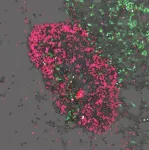(Press-News.org) An on-going, worldwide shortage of bacillus Calmette-Guérin (BCG) means that many patients with a common and serious type of bladder cancer have limited access to this effective standard of care treatment. But, for the first time in almost 50 years, there appears to be a viable treatment alternative.
A new study from the University of Iowa finds that a safe, inexpensive combo-chemotherapy is better tolerated than BCG and is better at preventing high-grade cancer recurrence in patients with non-muscle invasive bladder cancer (NMIBC).
Bladder cancer is the sixth most common cancer in the U.S., and NMIBC accounts for about 75% of bladder cancer cases. High-risk NMIBC has a significant risk of both recurrence and progression. Typical treatment for high-risk NMIBC involves surgical removal of the tumor followed by treatment with BCG.
The new approach, which was developed by Michael O’Donnell, MD, at the University of Iowa over 10 years ago, replaces BCG with a combination of two inexpensive, readily available chemotherapy drugs—gemcitabine and docetaxel (gem/doce). Based on this pioneering research from the UI, other major cancer centers have increasingly adopted this regimen, as well. Most recently, a UI study published in 2022 showed that 82% of patients with high-risk NMIBC who were treated with gem/doce instead of BCG remained cancer-free two years after treatment.
“With that earlier study we showed that patients with untreated non-muscle invasive bladder cancer who received gem/doce had excellent safety and efficacy outcomes that were on par with historical outcomes of BCG,” says Vignesh Packiam, MD, clinical assistant professor of urology with UI Health Care. “This was novel and impactful as it provides the first highly effective and accessible alternative to BCG, for which none previously existed. However, one limitation in that study was there was no direct comparison to the standard of care treatment—BCG.”
With the new study, published Feb. 28 in JAMA Network Open, Packiam, O’Donnell and their UI colleagues address that limitation by retrospectively comparing outcomes of 312 patients who received either gem/doce or BCG over a 10-year period at UI Hospitals & Clinics.
The study found that gem/doce provided better recurrence-free survival in patients with high-risk NMIBC compared to BCG, and fewer patients who received gem/doce therapy discontinued their treatment compared to patients who received BCG.
“The results were very promising,” says Packiam, who also is a member of UI Holden Comprehensive Cancer Center. “We believe this new study will have an immediate impact as it shows stronger evidence for using gem/doce for patients with newly diagnosed non-muscle invasive bladder cancer, for whom there is no alternative option due to the BCG shortage.”
The findings also provide valuable support for the phase 3 BRIDGE trial, a prospective multi-institutional randomized controlled trial that was recently activated and that will be the definitive trial for gem/doce compared to BCG for NMIBC.
In addition to Packiam and O’Donnell, the UI team included first author Ian McElree, a medical student at the UI Carver College of Medicine, as well as Ryan L. Steinberg, MD, and Sarah Mott.
The study was funded in part by grants from the National Cancer Institute and the John and Carol Walter Family Foundation.
END
Alternative bladder cancer treatment emerges amid worldwide shortage of standard of care BCG
A combination of two inexpensive, readily available chemotherapy drugs performs better than BCG
2023-02-28
ELSE PRESS RELEASES FROM THIS DATE:
Researchers’ model for TV ad scheduling reaps revenue increase for networks
2023-02-28
Whether it’s Flo from Progressive or the Geico gecko, the average TV viewer may not give much thought to commercials outside of whether they’re entertaining or not. However, there is a rather complex science behind what commercials you see and when you see them.
Rensselaer Polytechnic Institute’s Sebastian Souyris, an assistant professor of supply chain and analytics who holds the Dean R. Wellington ’83 Teaching Professorship in Management at the Lally School of Management, along with his ...
Steel was already used in Europe 2900 years ago
2023-02-28
A study by an international and interdisciplinary team headed by Freiburg archaeologist Dr. Ralph Araque Gonzalez from the Faculty of Humanities has proven that steel tools were already in use in Europe around 2900 years ago. Using geochemicalanalyses, the researchers were able to prove that stone stelae on the Iberian peninsula that date back to the Final Bronze Age feature complex engravings that could only have been done using tempered steel. This was backed up by metallographic analyses of an iron chisel from the same period and region (Rocha do Vigio, Portugal, ca. 900 BCE) that showed the necessary carbon content to be proper steel. The result was also confirmed ...
Better metric for prioritizing conservation of “evolutionarily distinctive” species
2023-02-28
An updated metric for prioritizing species’ conservation that incorporates scientific uncertainty and complementarity between species, in addition to extinction risk and evolutionary distinctiveness, is publishing February 28th in the open access journal PLOS Biology, authored by Rikki Gumbs from the Zoological Society of London (ZSL), UK, and colleagues.
In 2007, ZSL established the Evolutionarily Distinct and Globally Endangered (EDGE) metric to prioritise species for conservation based on preserving evolutionary history embodied within endangered species. The approach ...
Parental investment may have aided evolution of larger brains
2023-02-28
A review of evidence from prior research provides new support for the possibility that the evolution of larger brains in some species was enabled through increased energy investment by parents in their offspring. Carel van Schaik of the Max Planck Institute for Animal Behavior in Konstanz, Germany, and colleagues present their arguments in a paper publishing February 28th in the open access journal PLOS Biology.
Between different species, larger relative brain size is associated with cognitive benefits that favor survival. However, larger brains ...
Profiling abortions in low- and middle-income countries
2023-02-28
Multiple factors including a women’s age, marriage status, education and how many living children she has, are associated with pregnancy termination in low- and middle-income countries, according to a new study published this week in the open-access journal PLOS Global Public Health by Djibril Ba of Penn State College of Medicine, US, and colleagues.
In low- and middle-income countries (LMICs), a woman’s decision to terminate a pregnancy is often impacted by a patriarchal structure of society, restrictive abortion laws, cultural and religious beliefs and economic factors. About 45% ...
Hollings researchers develop small molecule to stimulate natural killer cells against neuroblastoma
2023-02-28
An MUSC Hollings Cancer Center research team has created what team members believe to be among the first small molecules designed to stimulate immune cells to fight cancer. More importantly, these compounds inhibit a specific enzyme that hasn’t been targeted with small molecules for the treatment of cancer.
Small molecules are, quite literally, small. They’re hundreds of times smaller than monoclonal antibodies currently used in therapy, and they’re also structurally much simpler. Because of their low molecular mass, they are much more likely to enter cells. Aspirin, for example, is a small molecule ...
'Informal carers’ experienced mental health decline ‘akin to divorce’ during COVID lockdowns
2023-02-28
People who became carers during Covid-19 by helping family members, friends or neighbours in need experienced a sharp decline in their own mental health, new research from Lancaster University reveals.
Using the General Health Questionnaire (GHQ) scale – a psychometrically validated and widely used index of psychological distress – researchers studied individual responses to the UK Household Longitudinal Study (Understanding Society).
They looked at 4698 participants from a total of 11 surveys - three before COVID-19 and eight collected between April 2020 ...
CU School of Medicine researchers part of national team that identified a new dietary approach to treatment for eosinophilic esophagitis
2023-02-28
Research by a team that includes two faculty members from the University of Colorado School of Medicine may change the treatment paradigm for patients with eosinophilic esophagitis (EoE), an allergic condition that causes chronic inflammation in the esophagus that can lead to esophageal narrowing and dysfunction.
Glenn Furuta, MD, professor of pediatric gastroenterology, hepatology, and nutrition, and Paul Menard-Katcher, MD, associate professor of gastroenterology, helped lead the National Institutes of Health (NIH)-funded, multisite study that shows that a single-food ...
New purification method could make protein drugs cheaper
2023-02-28
CAMBRIDGE, MA -- One of the most expensive steps in manufacturing protein drugs such as antibodies or insulin is the purification step: isolating the protein from the bioreactor used to produce it. This step can account for up to half of the total cost of manufacturing a protein.
In an effort to help reduce those costs, MIT engineers have devised a new way to perform this kind of purification. Their approach, which uses specialized nanoparticles to rapidly crystallize proteins, could help to make protein drugs more affordable and accessible, especially in developing ...
Graphene Flagship spin-off company INBRAIN Neuroelectronics wins prestigious innovation award
2023-02-28
INBRAIN Neuroelectronics, a Graphene Flagship spin-off company, has been named Spain’s most innovative company by leading Spanish news publication El Periódico.
INBRAIN exists to decode and modulate neural networks to improve patients’ lives. More specifically, INBRAIN is harnessing the unique properties of graphene to develop high density and high-resolution brain interfaces coupled to an intelligent system with high signal processing power to provide breakthrough neuroelectronic therapies.
The company was founded in 2020 by researchers from Graphene Flagship partner the Catalan Institute of Nanoscience ...
LAST 30 PRESS RELEASES:
DEGU debuts with better AI predictions and explanations
‘Giant superatoms’ unlock a new toolbox for quantum computers
Jeonbuk National University researchers explore metal oxide electrodes as a new frontier in electrochemical microplastic detection
Cannabis: What is the profile of adults at low risk of dependence?
Medical and materials innovations of two women engineers recognized by Sony and Nature
Blood test “clocks” predict when Alzheimer’s symptoms will start
Second pregnancy uniquely alters the female brain
Study shows low-field MRI is feasible for breast screening
Nanodevice produces continuous electricity from evaporation
Call me invasive: New evidence confirms the status of the giant Asian mantis in Europe
Scientists discover a key mechanism regulating how oxytocin is released in the mouse brain
Public and patient involvement in research is a balancing act of power
Scientists discover “bacterial constipation,” a new disease caused by gut-drying bacteria
DGIST identifies “magic blueprint” for converting carbon dioxide into resources through atom-level catalyst design
COVID-19 vaccination during pregnancy may help prevent preeclampsia
Menopausal hormone therapy not linked to increased risk of death
Chronic shortage of family doctors in England, reveals BMJ analysis
Booster jabs reduce the risks of COVID-19 deaths, study finds
Screening increases survival rate for stage IV breast cancer by 60%
ACC announces inaugural fellow for the Thad and Gerry Waites Rural Cardiovascular Research Fellowship
University of Oklahoma researchers develop durable hybrid materials for faster radiation detection
Medicaid disenrollment spikes at age 19, study finds
Turning agricultural waste into advanced materials: Review highlights how torrefaction could power a sustainable carbon future
New study warns emerging pollutants in livestock and aquaculture waste may threaten ecosystems and public health
Integrated rice–aquatic farming systems may hold the key to smarter nitrogen use and lower agricultural emissions
Hope for global banana farming in genetic discovery
Mirror image pheromones help beetles swipe right
Prenatal lead exposure related to worse cognitive function in adults
Research alert: Understanding substance use across the full spectrum of sexual identity
Pekingese, Shih Tzu and Staffordshire Bull Terrier among twelve dog breeds at risk of serious breathing condition
[Press-News.org] Alternative bladder cancer treatment emerges amid worldwide shortage of standard of care BCGA combination of two inexpensive, readily available chemotherapy drugs performs better than BCG





